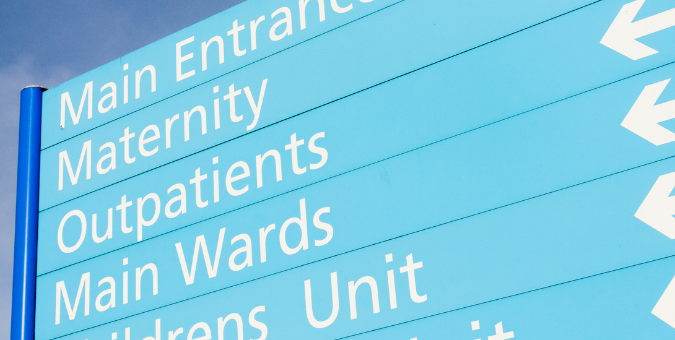
In anticipation of the final report’s publication and in response to the BBC’s Panorama programme, we recently produced a guide which summarised the last 20 years of maternity scandals in England and Wales, and our view on the action needed to prevent future deaths. One of the Hospitals featured in our summary was Shrewsbury and Telford Hospital NHS Trust and today, the final report (which can be read here) from the Ockenden Maternity Review has been published. We have summarised its findings below.
The review was created in response to the deaths of Kate Stanton Davies and Pippa Griffiths, and the tireless campaigning of their parents Rhiannon Davies and Richard Stanton, and Kayleigh and Colin Griffiths. Their bravery and commitment to getting answers to their questions and ensuring no other family had to go through the same thing has been phenomenal, and provided a voice to 1,486 families. The report, and the positive steps and improvement in maternity standards across the country that will come from it, will create an important and impactful legacy for Kate and Pippa, and their parents should feel immense pride at what they have achieved.
Donna Ockenden has praised the NHS as a whole, particularly during the overwhelming challenges faced during the ongoing pandemic. However, she stated that this report ‘is about an NHS maternity service that failed. It failed to investigate, failed to learn and failed to improve and therefore often failed to safeguard mothers and their babies at one of the most important times in their lives’.
WHAT DOES THE FINAL OCKENDEN MATERNITY REVIEW REPORT SAY?
The report highlighted concerns in almost all areas of maternity care at the Trust. Therefore we have summarised the main areas of concern identified below :-
- Babies’ growth was not appropriately monitored during antenatal appointments which meant it wasn’t recognised when babies weren’t growing properly
- A reluctance to refer mums for external advice/care when an abnormality was found on a scan and often not investigating when it was found after the baby was born that an abnormality had been missed
- General concerns about the management of complex pregnancies including those with more than one baby, mums with high blood pressure, diabetic care and care of vulnerable mums
- Lack of Consultant review of high risk women who had been admitted for care. A lack of Consultant presence on wards generally was also noted.
- CTGs (Cardiotocography – a machine used to monitor the baby’s heartrate) were often not interpreted correctly or there was a delay in acting when it showed that the baby was in distress. There was also a failure to monitor mum and babies appropriately in labour generally.
- Medication was given to increase the strength and frequency of contractions when it was not needed or continued/increased when it should have been stopped.
- Poor record keeping in terms of why decisions were made and discussions with parents about important decisions (including the advice and options given)
- Staff shortages (including the frequent use of locums without supervision) and a lack of ongoing training
- Postnatal care was also criticised, including Consultant follow-up
- Significant cultural issues which covered matters such as:-
- A potential reluctance to incorporate national guidance into their own local guidelines, for example, the management of mums with high blood pressure
- A reluctance to perform caesarean sections (although some staff dispute this), influencing decisions made and options offered to women
- Families’ views not being listened to and taken into account when decisions were made
- Mums and their families suffered psychological trauma as a result of physical injury, pain, a lack of attention, vulnerability, unkind words, swearing, sarcasm and bullying
- Staff fearing speaking out about concerns and a general reluctance to escalate concerns to doctors about mums and babies who needed a medical review, meaning the review didn’t happen at all, or was delayed
- Internal investigations not being carried out when they should have been and cases were not referred to external bodies when they should have been
Overall, the above issues led to at least 201 babies and 9 mothers dying unnecessarily and 94 children suffering harm that could have been avoided.
The review’s most shocking finding is that these errors continued over a 20 year period with a repeated failure to acknowledge, investigate and learn from mistakes, resulting in the same thing happening again and again. It is hoped that the report will act as a wake-up call for maternity services around the country about the importance of learning and improvement.
WHAT ACTION DOES THE REPORT SAY IS NEEDED?
The report contains 15 ‘Immediate and Essential Actions’ to improve maternity care in England. In essence, this means the steps are more than simple recommendations but regarded as vital to achieving a safe maternity service across the country, which is what every person and family demands and expects.
Briefly, the Actions required are:-
- Workforce – this includes funding a safe maternity workforce (such as ensuring there are enough funds so staffing levels are kept at an agreed minimum level) and improvements to training for new joiners and beyond, including training in specialist areas, with a budget set aside to achieve this.
- Safe staffing – when staffing levels are below the agreed minimum, there must be a clear action plan in place to address this. The action also refers to stopping the roll out of the Midwifery Continuity of Carer model.
- Escalation and accountability – staff must be empowered to escalate concerns about mums and babies, including a clear understanding of when concerns should be raised and the level of doctor needed, with appropriately trained doctors being available at all times to provide this support.
- Leadership – Hospital Trust boards must have oversight of the quality and performance of their maternity services. Further, the Director of Midwifery and Clinical Director for obstetrics must be jointly responsible and accountable for the maternity services. Every Trust must also have a maternity patient safety specialist.
- Incident Investigation and Complaints – these must be meaningful for families and staff, and ensure lessons are learnt and actioned within a reasonable timeframe of the event (for example, six months). Formal investigations must be carried out when required and any complaint trends monitored.
- Learning from maternal deaths – post mortems must be performed by someone with a specialism in maternal physiology and investigations must look at all aspects of the care provided.
- Multidisciplinary training – staff who work together must attend training together and staff should attend regular mandatory training with rotas allowing time for this. Staff must also not be allowed to work on a labour ward without regular CTG and emergency skills training.
- Complex antenatal care – mums with pre-existing conditions must have access to pre-conception care and care in complex pregnancies (twin/triplet etc, diabetes and raised blood pressure) must be in line with national guidance.
- Preterm birth – there must be systems in place to manage mums at high risk of going into labour before 37 weeks and the NHS Saving Babies’ Lives Version Two (a ‘toolkit’ to help reduce stillbirths) must be implemented.
- Labour and birth – mums who choose to give birth outside hospital must be given accurate advice on the transfer time to hospital, if needed during labour. There must also be a centralised CTG monitoring system in all obstetric units.
- Obstetric anaesthesia – there must be anaesthetic follow up where harm may have been caused, clear recording keeping by anaesthetists and staff shortages must be addressed.
- Postnatal care – consultant reviews must take place when mums are readmitted to hospital or are unwell whilst still in hospital. The postnatal wards must also have appropriate staffing levels.
- Bereavement care – all mums who have suffered baby loss must have access to appropriate bereavement care services every day. The National Bereavement Care Pathway (NBCP) guidance should be considered.
- Neonatal care – there needs to be clear guidance on when a baby needs neonatal care/to be born at a hospital with a neonatal intensive care unit and the availability of such care needs to be extended (e.g. availability of neonatal cots and experienced staff).
- Supporting families – the mental health of mum and family must be seen as an important part of maternity care and additional support made available if needed
WHAT ACTION IS THE GOVERNMENT TAKING?
The Government has taken steps to try and address these concerns on a national level with an announcement on 24 March of an additional £127m funding for maternity services in England. This funding (spread over a number of years) is intended to increase staffing levels and improve retention rates, help shape the culture and leadership of these departments and increase the number of neonatal cots available to treat poorly babies. However, more needs to be done as the estimated cost of fully funding maternity services has been estimated to be been £200m and £350m per year.
They have also set up the Special Health Authority (replacing the HSIB) to investigate maternity care. The intention is that this is an independent body which will take a family centred approach to investigating maternity care, and provide much needed answers to families within a reasonable timeframe. The Ockenden report recommends that, for these investigations to help avoid further deaths, they need to be completed and any change implemented within six months of the care investigated.
IS THIS THE END OF MATERNITY SCANDALS?
Unfortunately, no. There are currently ongoing investigations into care provided by East Kent Hospitals University NHS Foundation Trust (the Kirkup Review) and Nottingham University Hospital Trust. Until the actions identified in the Ockenden Report are implemented nationally, it is also possible that further Trusts may be identified and investigated as providing poor maternity care and sadly more babies and mums will suffer avoidable deaths or injuries in the meantime.


















